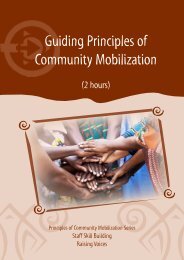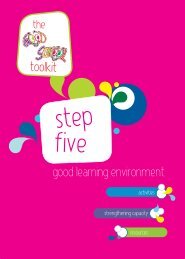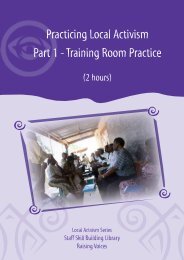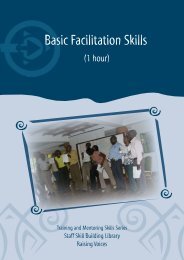CA C 1 - Raising Voices
CA C 1 - Raising Voices
CA C 1 - Raising Voices
You also want an ePaper? Increase the reach of your titles
YUMPU automatically turns print PDFs into web optimized ePapers that Google loves.
<strong>CA</strong>C<br />
264<br />
Mobilising Communities to Prevent Domestic Violence<br />
<strong>CA</strong>C<br />
■ Clarify what participants contribute using gentle probing questions and by repeating back what<br />
you think is being said.<br />
■ Invite elaboration without embarrassing participants by using neutral questions, such as, “Can you<br />
say more?”<br />
■ Extract meaning from a set of contributions by summarizing them, thereby linking them to form a<br />
collective analysis.<br />
d) Intervene if you feel the group’s objectives are being compromised:<br />
■ Seek contributions from different participants if one or two of them are dominating the group.<br />
■ Have a private word with a participant if s/he is promoting an agenda for personal instead of<br />
collective learning or one that opposes the group’s learning objectives.<br />
■ Focus the discussion if it is becoming diffuse and straying from the objectives of the workshop.<br />
■ Boost the energy of the group by introducing a game or a physical activity, especially if energy is<br />
low during a demanding discussion or the heat of the afternoon (appendix P).<br />
e) Create a learning environment:<br />
■ During the workshops, hang all of the flipcharts in different parts of the room so participants can<br />
be surrounded by and visually reminded of all the discussions and activities.<br />
■ Summarize frequently and always summarize at the end of each activity to highlight the collective<br />
learning that has occurred.<br />
■ End each day with an overview of the day’s discussions and, if appropriate, questions for<br />
overnight reflection.<br />
■ Begin each new day with an overview of the previous day’s work and with an opportunity to<br />
contribute overnight reflections.<br />
■ Conduct an oral evaluation of the process and a written evaluation if appropriate. This allows the<br />
participants to come to a collective emotional and intellectual understanding of the process.<br />
■ Ensure, whenever possible, that participants have had an opportunity to think about what they will<br />
do practically with what they have learned.<br />
■ Discuss, if appropriate, what support the participants will need, and who from, to apply what they<br />
have learned.<br />
Every time you facilitate a learning process, the participants are placing their trust in you and therefore<br />
placing on you the responsibility to be as effective as you can be. Becoming an effective facilitator is<br />
primarily about having respect for the participants you are working with. If you begin with that, then the<br />
rest will come with experience and practice. It is also important to believe in your ability to make a<br />
meaningful contribution to the development of the participants. Keep learning from each process you<br />
facilitate and, above all, make it fun!<br />
Recommendations<br />
■ If possible, hold the workshops at a residential site a bit out of town to decrease interruptions. A<br />
physical distance from home responsibilities often deepens participants’ involvement in a workshop.<br />
■ Choose the location carefully to make sure it can comfortably accommodate your group, has plenty

















